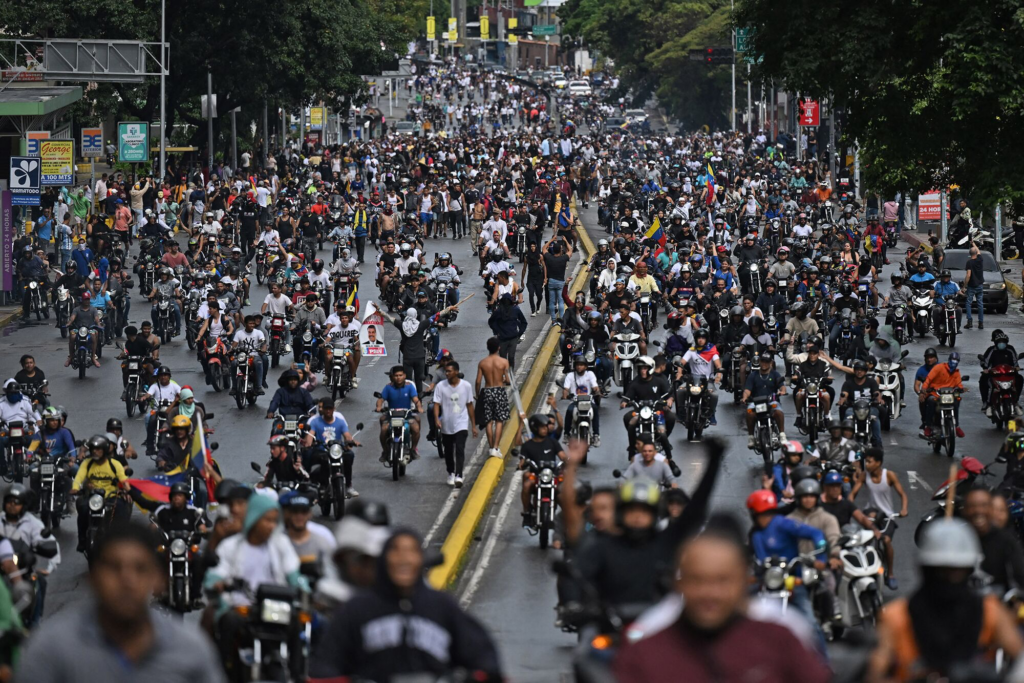
Demonstrators take to the street to protest the presidential election results in Caracas on July 29, 2024.Photographer: Raul Arboleda/AFP/Getty Images
Protests broke out across Venezuela on Monday after the national electoral authority officially declared Nicolás Maduro as the winner of the election, a result widely criticized for alleged electoral fraud. In the capital of Caracas, hundreds of protestors poured into the streets, setting fire to Maduro’s election posters.
Caracas- Protests erupted in Venezuela’s capital Monday as the regime deflected charges it had rigged an election win for President Nicolas Maduro that the opposition has disputed and many in the international community have questioned.
Thousands of people poured onto the streets of Caracas chanting: “Freedom, freedom!” and “This government is going to fall!”
Several were seen ripping Maduro campaign posters from street posts and burning them.
Maduro, 61, attended a meeting on Monday where the National Electoral Council (CNE) certified his reelection to a third six-year term from 2025 to 2031.
At the event, he dismissed international criticism and doubts about the result, claiming Venezuela was the target of an attempted “coup d’etat” of a “fascist and counter-revolutionary” nature.
Attorney General Tarek William Saab linked opposition leader Maria Corina Machado to an alleged hacking “attack” to “adulterate” the results.
The elections were held Sunday amid widespread fears of fraud and a campaign tainted by accusations of political intimidation.
Pollsters had predicted a resounding victory for the opposition despite institutions loyal to the regime barring the popular Machado from participating.
In the early hours of Monday, the CNE said Maduro had won 51.2 percent of votes cast compared to 44.2 percent for Machado’s proxy, Edmundo Gonzalez Urrutia.
The opposition cried foul, saying it had taken at least two-thirds of the vote.
“Depressed. Disappointed. Humiliated,” Giovanni Inglese, a 65-year-old man who guards cars for a living, told AFP Monday of his state of mind. He was convinced the outcome had been “manipulated,” he added.
“Humiliated… because the crook is the one who wins in this country.”
The result sparked concern over irregularities from the United Nations, United States, European Union and several countries in Latin America, although many of Venezuela’s allies congratulated Maduro.
‘Another fraud’
Gonzalez Urrutia, a 74-year-old former diplomat, vowed late Sunday that “we will not rest until the will of the Venezuelan people is reflected.”
Machado said the election was “another fraud.”
Despite the official result, she said: “Venezuela has a new president-elect and it is Edmundo Gonzalez Urrutia.”
Nine Latin American countries called in a joint statement Monday for a “complete review of the results with the presence of independent electoral observers.”
The US-based Carter Center, one of a few organizations allowed to bring observers into Venezuela, urged the CNE to immediately publish detailed polling station-level results.
Brazil and Colombia also urged a review of the numbers while Chile’s president said the outcome was “hard to believe.”
Peru recalled its ambassador and Panama said it was suspending relations with Caracas.
US Secretary of State Antony Blinken expressed “serious concerns” while European Union foreign policy chief Josep Borrell and UN Secretary-General Antonio Guterres urged “transparency.”
Maduro received congratulations from allies China, Russia, Cuba, Nicaragua, Honduras and Bolivia, and Mexico said it would recognize the result.
‘Bloodbath’ warning
Independent polls had predicted Sunday’s vote would end 25 years of “Chavismo,” the populist movement founded by Maduro’s socialist predecessor and mentor, the late Hugo Chavez.
Maduro has been at the helm of the once-wealthy oil-rich country since 2013. The last decade has seen GDP drop by 80 percent, pushing more than seven million of its 30 million citizens to emigrate.
He is accused of locking up critics and harassing the opposition in a climate of rising authoritarianism.
In the run-up to the election, he had warned of a “bloodbath” if he lost.
Ballots were cast on machines that sent electronic votes directly to a centralized CNE database.
The machines printed out paper receipts that were placed in a container and counted by hand as a backup measure meant to be open to public scrutiny.
The opposition had deployed about 90,000 volunteer election monitors nationwide.
Economic misery
Sunday’s election was the product of a deal reached last year between the government and opposition.
That agreement led the United States to temporarily ease sanctions imposed after Maduro’s 2018 reelection, rejected as a sham by dozens of Latin American and other countries.
Sanctions were snapped back after Maduro reneged on agreed conditions.
Venezuela boasts the world’s largest oil reserves but has seen severely diminished production capacity in recent years.
Most Venezuelans live on just a few dollars a month, and endure biting shortages of electricity and fuel.
Economic misery in the South American nation has been a major source of migration pressure on the southern border of the United States, a country where immigration is a major presidential election issue this year.
(AFP)/FRANCE24


Leave a Reply
You must be logged in to post a comment.